
 |
|
| |||||||||||
|
Silent DVD Archive
The 2013 San Francisco Silent Film Festival
This was the tenth year in a row that I have attended the
San Francisco Silent Film Festival and the event hasn’t lost any of its
luster
in that time. If anything it keeps on
getting better each year. For 2013 the
staff of the festival put together some excellent examples of early
cinema and
matched the films with outstanding musical accompaniment.
There are only a few places that regularly
screen silent movies and there are even less that offer world-class
musicians
to play along with the films, so it’s well worth the trip.
This year the musical guests included Stephen
Horne, one of the absolute best solo musicians working with silent
films today,
The Mont Alto Motion Picture Orchestra, an outstanding group who have
played
all over the country, the Swedish quartet the Matti Bye Ensemble,
newcomer to
the festival Gunter Buchwald and many more.
The lineup of both movies and musical talent make this the
premier
showcase for silent cinema in the
This year attendees were presented with a wonderful mix of films. From popular classics to obscure gems, melodramas to comedies, Hollywood productions to films made around the globe and even the world premier of two new restorations, there was something for every taste and interest. This year’s festival included: Prix de Beauté: This film was the last time that Louise Brooks starred in a full length feature. Seen today, it’s quite surprising that the talented and gorgeous star had trouble finding work after burning her bridges in 
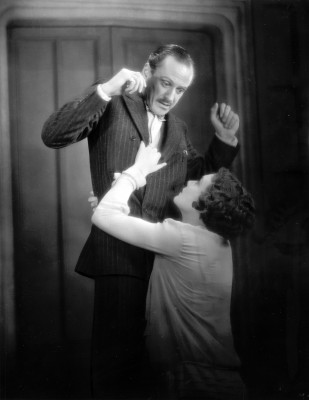 The First Born: Miles Mander wrote, directed, produced, and starred in this British film that revolves around the troubles a young upper class couple encounters when the wife doesn’t become pregnant and the lengths that they’ll both go to ensure the bloodline. Unfortunately Mander’s script is a bit of a mess. Not only does it contain not one but two deus ex machine endings, but the movie doesn’t hang together very well. Mander’s character, Sir Hugh Boycott, comes across as thoroughly repugnant, and viewers are left wondering why his wife is trying so hard to please him. What’s worse, the film drags for much of the running time. 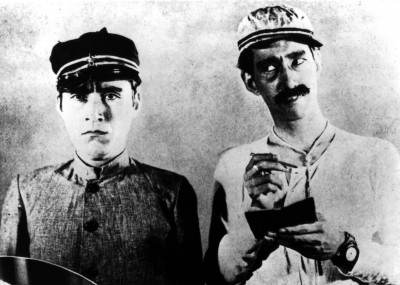 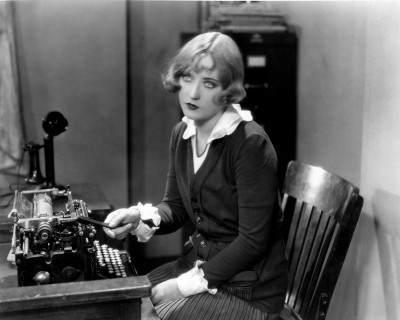 The Patsy: Marion Davies is best known as being the mistress of William Randolph Hearst, which is a terrible shame. She should be known as one of the best comediennes of the silent era, as this film aptly illustrates. Davies plays the younger daughter who has fallen for her older sister’s fellow, and tries to spend as much time with him as she can, much to the sister’s annoyance. When the older girl starts seeing a rich playboy, Davies sees her chance, but first she has to make herself charming and desirable. King Vidor directed this hilarious film and filled it with great actors. Davies is absolutely hilarious through the entire film, but the must-see moment comes when she tries to get a rise out of a drunken youth. She dresses up as series of movie stars (Mae Murray, then Lillian Gish, then Pola Negri) with hilarious spot-on impersonations. It’s a classic scene that showcases Davies comedic talent. Not only does Davies shine, but she’s supported by the incomparable Marie Dressler who plays her overbearing mother. Dressler is the definition of ‘formidable’ and she plays her role wonderfully. Her career was on the skids when she was offered this role, and afterwards Dressler was in high demand.  The Golden Clown: There’s a very good movie hiding in this Danish film, it just needs to be edited down a bit to reveal it. The clown in a small traveling circus, Joe, is offered a job in  Winsor McCay: His Life and Art: Academy Award winning animator John Canemaker presented this wonderful collection of animation by the groundbreaking and influential cartoonist and animator Winsor McCay. Canemaker gave a wonderful overview if McCay’s contribution to animation as well as presenting four of his works, Little Nemo, How a Mosquito Operates, Gertie the Dinosaur, and The Sinking of the Lusitania. While Gertie is easily his most famous cartoon, the final short of the program was his best. It was wonderfully animated and well before it’s time. The Half-Breed: The SF Silent Film Festival has set up a preservation fund, and this Douglas Fairbanks feature is the first movie that they’ve restored. When thinking of 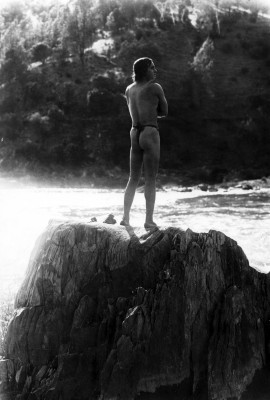 This film was incredibly interesting, and not just because Legong: Dance of the Virgins: A drama filmed in two-strip Technicolor on location in Gribiche: This French film directed by Jacques Feyder revolves around a young boy who aides an older wealthy American in a store. The heiress is so taken with the charming child that she convinces his mother to let him move in with her, so that she can raise him to be a proper gentleman and try out her rigid educational theories. It’s a decent drama that plays well on the big screen. 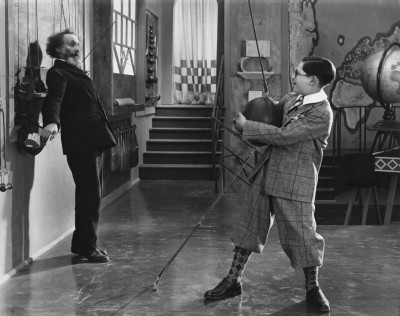 The House on 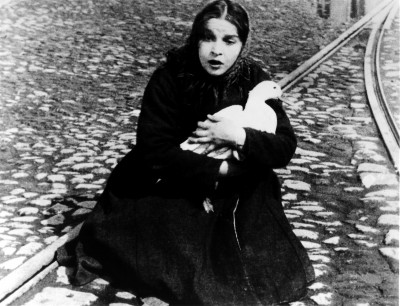 The 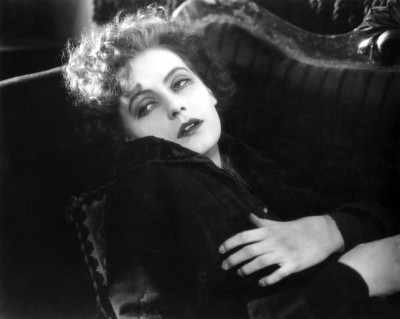 In Kings of (Silent) Comedy: A quartet of hilarious shorts: a Felix the Cat romp, Felix Goes West, Charley Chase’s best short, Mighty Like a Moose, Buster Keaton’s Love Nest, and the classic Chaplin short The Immigrant. They were all wonderful and had the theater laughing. 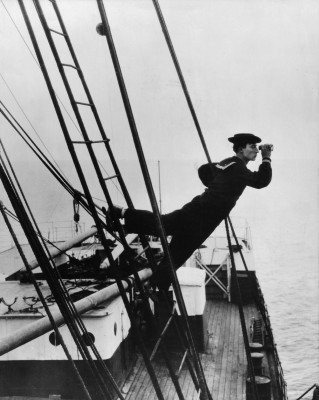 The Outlaw and His Wife: I want to give mention to the sponsor of this film, Fandor. It’s a pretty cool streaming site that has an impressive amount of early cinema (as well as some excellent foreign films) in its lineup. Cinephiles who are looking for more breath and variety than is available on Netflix or Amazon should check them out. (Fort the record, this is an unpaid and unsolicited recommendation.) You can read my full review of this Victor Sjöström film here.  The Last Edition: This is another film that was restored by the festival. It was preserved from the only surviving copy, an old nitrate print, which was held in the Dutch National Archives. It’s a ‘meat and potatoes’ flick set in the newspaper world of 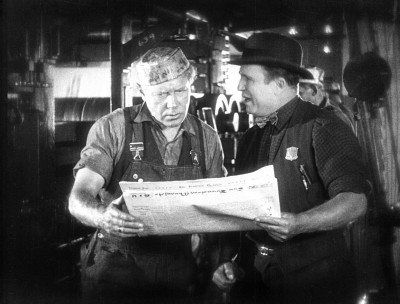 The Weavers: A 1927 German film, this was another great discovery. The movie relates the events of the 1844 revolts of cotton weavers in Peterswald, which became a rallying cry for revolutionaries in the following years. The weavers were very poor people who took yarn from a merchant and turned it into cloth. They barely made enough to survive but when mechanized looms were introduced and the price of fabric plummeted, their wages fell drastically. When a local man who ran off to join the army years before sees the state of his town, he rallies the weavers to storm the house of the rich merchant who has been oppressing them and then march on to the next city and destroy the looms that were killing their livelihood. This was a powerful film, one filled with fascinating scenes and some gloriously designed intertitle cards. Added to that was the magnificent musical accompaniment by Gunter Buchwald. A German native, Buchwald introduced the film with some words placing the film in its historical context as well as singing, and translating, the weaver’s song that’s featured in the movie. A folksong that would have been well known in 1920’s 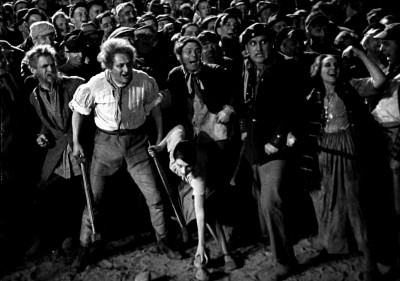 Safety Last: I’ve seen this film several times, but you just can’t beat watching it on the big screen with an appreciative audience and great live music. This is a classic of the silent era, and includes one of the most iconic images from early cinema, a bespectacled man hanging from the face of a clock high up on the side of a building. Harold Lloyd, one of the three biggest comedians from the silent era, stars in this hilarious ‘thrill film’ that centers on a man who has moved to the big city to make his fortune. Though he’s only a clerk in a department store, he’s been telling his girl back home that he’s wonderfully successful. When she shows up unexpectedly, he’s forced to go to extreme measures to climb the corporate ladder: climbing the side of a building as a publicity stunt. 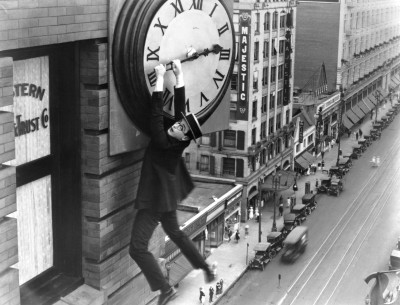 The Mont Alto Motion Picture Orchestra accompanied this film, their first time doing so, and their score was fun and energetic. It really made the film come alive. What was even more enjoyable was the audience. It’s great to hear hundreds of people gasp when Harold slips or looses his balance while trying to get a mouse out of his trouser leg. This was a great film to wrap up another wonderful film festival.
Archives
The 2013 San Francisco Silent Film Festival
The 2009 San Francisco Silent Film Festival Douglas Fairbanks - A Modern Musketeer The General - Kino's Ultimate 2-Disc Edition Compete Archives
Review Staff
| Newsletter Subscribe
| Join DVD Talk Forum
|
| |||||||||
| |||||||||||